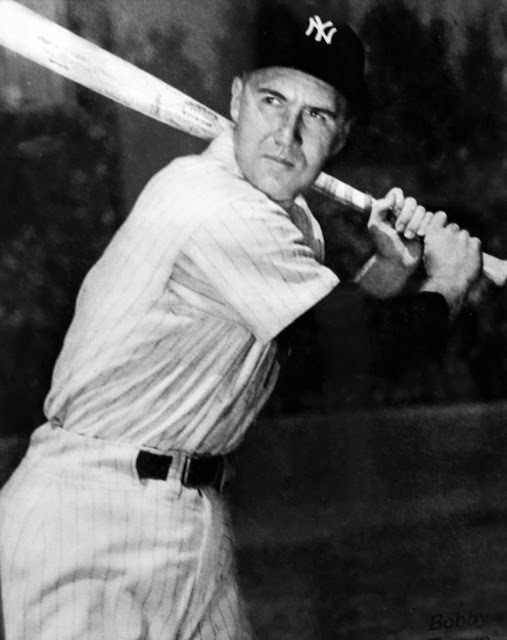
In real life, the Giants continued their onslaught against their crosstown rival Dodgers by not just taking both games of a weekend series, they dominated them 8-1 and 11-2. In my alternate reality, the two teams split the effort with the Dodgers taking Saturday's game 3-2, while the Giants picked up the Sunday contest 4-3. My games seem much more enjoyable. Brooklyn maintains it's comfortable 7 game lead rather than seeing it shrink, as it did in real life, to only 5.
But in the first game of this replay, it was interesting that Ralph Branca would toe the rubber for the Dodgers against the Giants and 1951's biggest hero, Bobby Thomson, in a rematch of the final at bat of the season. Over his career, Thomson faced Branca 66 times (a meaninful number for APBA fans). In those opportunities, he managed 4 home runs (including his most famous), but hit only .237 against Branca over his entire career. Thomson managed a 1 for 3 night with a walk for me.
 Ted Williams and the Red Sox were rained out in real life of their scheduled games against the Philadelphia Athletics on Saturday and Sunday. Those games were rescheduled as a double header in Philadelphia on September 7th. Even with a time machine, I can't change the weather. It turns out that weathermen in the early 1950s are just as accurate as they are in 2016.
Ted Williams and the Red Sox were rained out in real life of their scheduled games against the Philadelphia Athletics on Saturday and Sunday. Those games were rescheduled as a double header in Philadelphia on September 7th. Even with a time machine, I can't change the weather. It turns out that weathermen in the early 1950s are just as accurate as they are in 2016. |
| Doc Brown starts at third base for the Bronx Bombers No - not "that" Doc Brown |
The Yankees had their Sunday contest against the Senators washed out in the same torrential rain storm that cancelled play in Boston. But on Saturday, Eddie Lopat hurled a 4 hit shutout against the Senators, and the Yanks picked up a 5-0 win. In a "Back To The Future" moment, in the first game of the A.L. replay, Doc Brown was starting at third base for the Yankees. Great Scott!! This Doc Brown was not climbing a Clock Tower during the storm. See spotlight story at the bottom of the page.
Like the Bronx Bombers, the Tribe swept 2 game in the dry confines of Cleveland, as both teams matched their efforts in real life.
After my first weekend of games, I can tell, this is going to be a fun project for me. However, due to either scheduling or weather, on my first Monday of the replay, all 5 of the teams I'm following have double headers against non-contending teams. That means I have 10 games to enjoy on the first weekday of the schedule.
ON THIS DATE (September 1st)
IN BASEBALL HISTORY:
September 1, 1918 - Ty Cobb entered in relief of the second game of a double
header at Sportsman
Park
Cobb pitched twice in 1918 and would take
the mound again in 1925. Overall, he finished his career with a total of 5 innings and allowing only 2 earned runs
for a career ERA of 3.61.
September 1, 1945 - In Philadelphia
 |
| VINCE DiMAGGIO |
Vince's younger
brother Joe will retire at the end of this season (1951) with two batting titles, two home run
titles, and two RBI titles over his career.
Baby brother Dom led the league in runs scored, triples and stolen bases
last season. He will lead in runs scored
again this season. But Vince has more
titles than either younger sibling. He
has led the league in striking out SIX times!
(CRYSTAL BALL): In 1955, the grand slam record will be broken
by a young shortstop in Chicago

One of the things I've enjoyed so far, is learning about some of the lesser known stars of the era. Many of these guys were not just good ball players, but very interesing people. Robert "Doc" Brown is one of them.
 |
| Dr. Robert "Bobby" Brown American League President |
CLICK HERE FOR THE DALLAS MORNING NEWS ARTICLE
CLICK HERE FOR THE MLB STORY. DR. BROWN SPEAKS AT 2:28 IN THE VIDEO
CLICK HERE FOR THE MLB STORY. DR. BROWN SPEAKS AT 2:28 IN THE VIDEO















